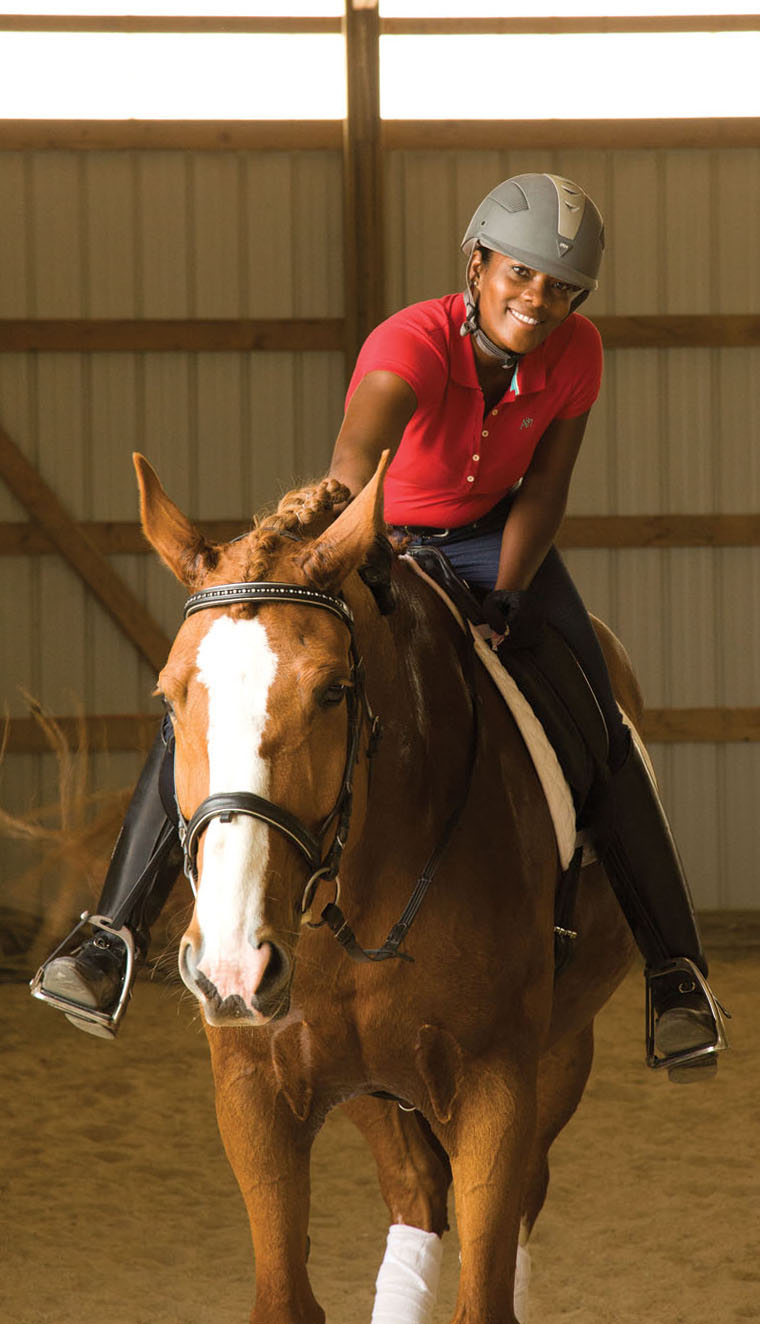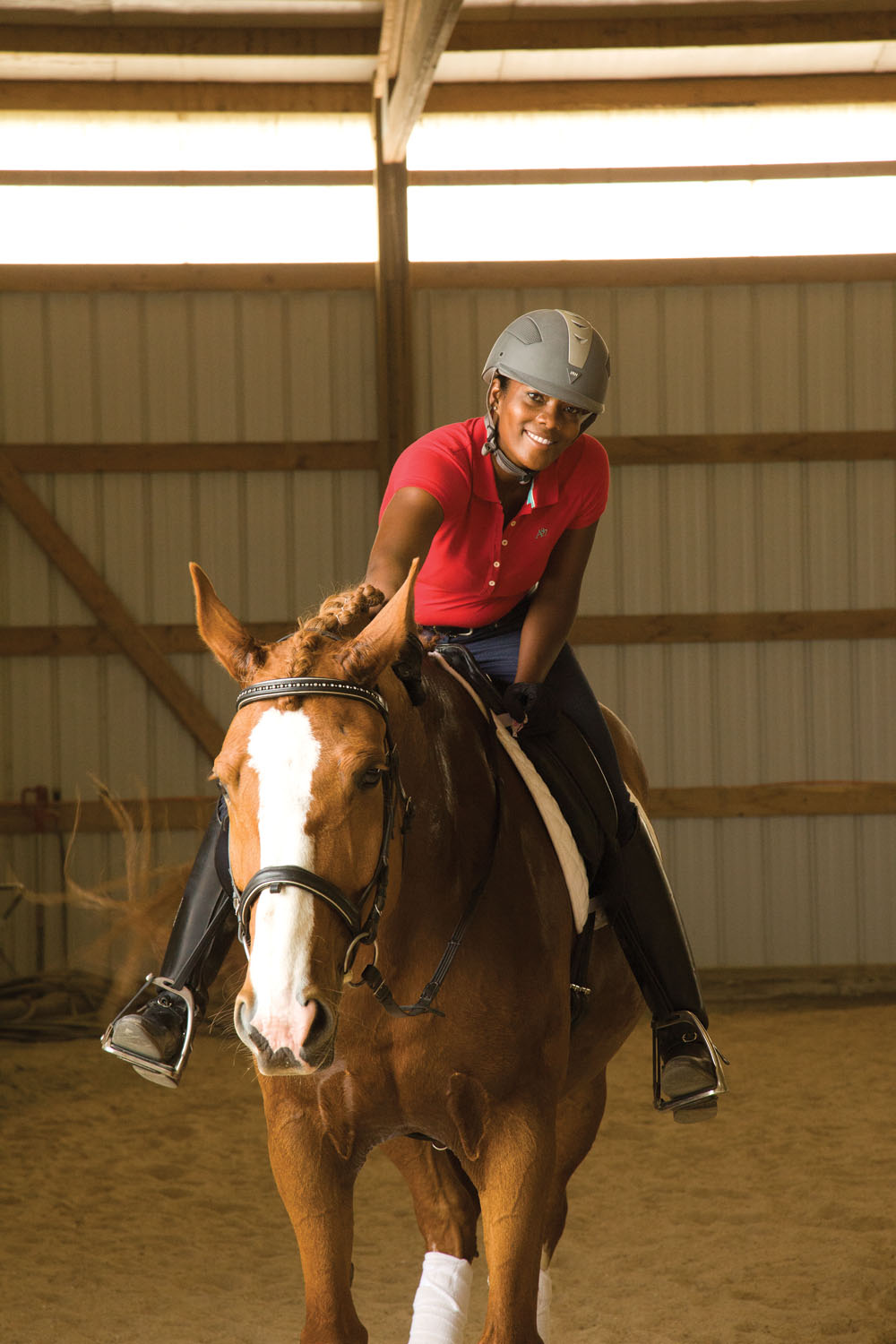 Philesha Chandler '07 can't recall a time when she wasn't thinking about horses. She remembers frequently visiting the park as a child with her beloved grandfather, Henry Chandler. Henry was there to fish, but Philesha had an ulterior motive.
Philesha Chandler '07 can't recall a time when she wasn't thinking about horses. She remembers frequently visiting the park as a child with her beloved grandfather, Henry Chandler. Henry was there to fish, but Philesha had an ulterior motive.
"I would beg to ride the pony," she says. "My grandfather and I spent a lot of time together, and he loved watching and attending the races. We watched horse racing together. I remember how beautiful they were. I always wanted to work with them."
Today, as the owner and head trainer of Chandler Dressage Inc., Chandler, 30, is living a childhood dream that began when she was just a toddler on a rocking horse.
Raised by her grandfather and grandmother, Anna, Philesha moved with her family to Wichita from Michigan when she was in grade school. "You try to encourage children to experience new things — dance, music and so on, but Philesha came to me and said, ‘I want to ride,'" says Anna Chandler, who was serving as director of the university's ethnic studies department when she retired from Wichita State after 17 years. "No one in the family rode, but we did believe that if a kid has a passion and you let them pursue it, they will do anything and everything to make it happen."
Taking it upon herself to look up stables in the Yellow Pages, 8-year-old Philesha found Wichita's Red Brush Farms and her first trainer, Lydia Wainwright.
"Even at eight, she was determined," Wainwright says. "She was so little, she couldn't put the saddle on the horse herself, but she was determined to do it and to learn to ride. She is a natural talent and nothing would have stopped her."
For Philesha, this year with Wainwright was a life-changing experience. "To be able to really ride after so many years of just dreaming about it — it was wonderful," she says. Over the next five years she learned the art of show jumping and developed a taste for competition.
When the young rider was 14, she and Granny Anna went on a trip to Chicago to see the North American Young Rider's Championships, an official USA Junior Olympic Equestrian Event. It was there she got her first glimpse of the sport of dressage.
"It was amazing," she says. "Graceful and powerful. I had to do it." Entranced by the movements of horse and rider, she studied each test as it was performed and committed it to memory. "I decided I would ride dressage in the NAYRC as soon as I possible could."
Dressage, (pronounced druh-sahzh), a highly technical equestrian sport that requires intimate communication between horse and rider, has been part of the modern day Olympics since 1912, making it one of the longest-running competitive events at the games. It has existed as a training and riding method for centuries, first documented by the Greek author and soldier Xenophon around 400 BC.
Initially, dressage was a strictly military endeavor, but in the early 1900s the U.S. Cavalry stationed at Fort Riley, Kan., collaborated with riding schools in Europe, exchanging techniques and instructors and launching the trend that brought dressage training not only to the military, but to U.S. civilians as well.
In 1948, the U.S. Cavalry was disbanded and the focus of dressage shifted to civilian competition. Women discovered the sport, and female riders were first allowed to compete in the Olympic Games in 1952. Today, women represent the majority of professional and hobbyist dressage riders.
The art of dressage requires the performance of proficiency riding tests, each made up of a series of challenging movements that the rider conveys to the horse with subtle commands, using her legs, hands, seat and weight. Dressage riders aren't allowed to speak to their horses during competition, and the movements of horse and rider must appear effortless.
Chandler's decision to compete in the NAYRC was not a lark, and to meet her goal of performing, she needed a horse — and not just any horse will do in the dressage arena. A trained dressage mount is very costly. So she set out to find a horse with potential. That's when she met Marcel.
"We were a good match" she says. "He had attitude. They used to tease me about who was more stubborn, Marcel or me." Studying the many tests and various levels of dressage competition, Chandler trained Marcel herself. For six years the rider worked tirelessly with her mount and a series of trainers. At age 20, she was ready for NAYRC and so was Marcel. She entered the competition with high hopes.
"It was a disaster," she says. "Marcel was fabulous, but I faced some challenges with my trainer and didn't meet my own expectations. I was devastated. I had missed proms and so many other things young people experience to achieve my goals."
Chandler may have been disappointed, but she wasn't discouraged. "I came home and let Marcel chill out for a bit," she recalls. "I continued training and was asked to manage a facility. Then suddenly, I had an opportunity to work with Robert Dover."
Dover has earned more honors than any other U.S. dressage rider in history. He has competing in six consecutive Olympiads for the United States Equestrian Team, as well as for World Championship teams and at seven World Cup events. Thought by many in the industry to be the greatest living American dressage rider, Dover was preparing to shoot a new television series: The Search for America's Next Equestrian Star: Dressage. A chance to work with Dover is the chance of a lifetime for a devoted dressage athlete.
"I fancied up Marcel and we did a video with the help of WSU's Media Resources Center," she says. "We submitted the video and crossed our fingers. I wasn't feeling at the top of my game — and neither was Marcel. But we made the top 25. I was so surprised that when Robert called, I didn't believe it was him."
Chandler was selected as one of the up-and-coming dressage stars to compete on the show. The five finalists earned the honor to train with Dover for one month before a winner was selected. The winner would become Dover's assistant. True to her dream, Chandler worked harder than ever and won the competition.
"It was an amazing experience and I learned so much," she says. "He is, in my opinion, the best. He respects his horses and takes their well-being very seriously. He expects you (as the rider) to take the pressure, so the horse doesn't have to overwork. Because of his relationship with his horses, they come out ready to do battle for him."
Her own compassion for horses had always inspired her training and riding techniques, but Dover's guidance reinforced and increased her focus. "Many people love their horses, but they don't respect them," says Chandler, who studied sociology as her field major at Wichita State. "So it's not a healthy relationship. Horses are individuals, just like people. They have personalities and clash with some people. They require patience and kindness."
Known for her positive and inspirational training techniques, Chandler notes, "It's important to be attentive to build a horse's confidence and trust. When you take them to compete, the environment is new and unfamiliar. They need to know that whatever situation you put them in, you won't let anything bad happen to them. It's my job to ensure that each horse reaches its potential."
Chandler adores her day job, working as a trainer with horses and their people, but she has a goal she set as a child — and she intends to achieve it. "I want to ride in the Olympics," she says and adds with a smile: "When I was in high school, my boyfriend and I were talking about the future. He said he had no idea what God intended for him. I said, ‘I know what God wants me to do. He wants me to ride in the Olympics.'"
Competing in the Olympics is a real possibility for Chandler, given her high level of ability and determination. There is a major factor, however, that is beyond her control. She has to meet the right horse — one with the ideal stature, personality and willingness to train. As she says, "The stars have to align." The good news is that unlike in many sports, age is not a disadvantage. In fact, as long as a rider stays fit and avoids injury, age and experience can work in her favor. So the athlete continues to search for her ideal partner.
Most dressage riders emerge from a family dedicated to equestrian interests. For Chandler, the pursuit of excellence in the dressage arena grew from her own passion for horses. Her family, however, plays an important role in her success, and she is grateful for this support and inspiration. "My son Preston (2) is a huge influence on me. Before I was a mother, I was too timid to step out on my own (and create a business). Providing for him keeps me striving to be better and more successful every day."
And then there is Granny Anna: "She's always been my No. 1 fan. In all of my years of riding, she has only missed two shows out of more than one hundred."
As for Anna, her pride knows no bounds when it comes to her granddaughter. "We are a family which highly values education," she says. "I told Philesha I would support her absolutely, as long as she completed her degree. She did so, and while she was riding, working and studying. Philesha and her grandfather were so close. I often think how proud he would be of all of her accomplishments."






